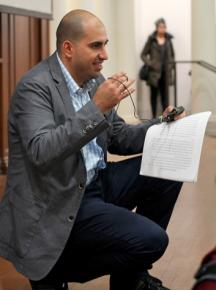Steven Salaita is speaking out
Fired professor Steven Salaita spoke out at meetings in Chicago, reports .
STEVEN SALAITA, the professor fired in August by the University of Illinois Urbana-Champaign (UIUC) for his angry tweets denouncing Israel's war on Gaza this summer, kicked off the first leg of an ambitious public-speaking tour this week, talking about his campaign for reinstatement and the broader attack on academic freedom for pro-Palestine voices.
Salaita's tour of the Chicagoland area took him to Northwestern University, the University of Chicago, Columbia College and DePaul University. Throughout the week, he found time to meet with groups of supporters, while also making a splash in the local media with an op-ed article in the Chicago Tribune and an interview on WBEZ, Chicago's public radio station.
In November, he plans on making a similar tour of campuses in the New York City area, and plans are underway for a West Coast tour early next year.
UIUC fired Salaita on August 2 after pro-Israel donors orchestrated a campaign directed at Chancellor Phyllis Wise and UIUC other administrators. Their charge? Salaita's Twitter criticism of Israel during Israel's war on Gaza was "anti-Semitic." But any honest survey of his extensive Twitter commentary demonstrates that Salaita routinely and explicitly denounced anti-Semitism.

What infuriated these pro-Israel donors was Salaita's criticism of Israel. The spurious charge of "anti-Semitism" was mobilized to silence him--and send a warning to others in the academy who might dare to voice such views.
The firing outraged students and faculty at UIUC--and many more people across the country. During Rosh Hashana, a gathering of about 30 Jewish students and faculty at UIUC held a modified version of the traditional tashlich ritual in protest of Salaita's hiring.
"Most wore stickers of the sideways letter 'I' over their mouths, as in previous protests of the Salaita firing, to symbolize censorship at the university," reported Samantha Brotman for Mondoweiss. "The stickers used at the tashlich service, however, contained an image of the Israeli flag inside the sideways 'I', symbolizing the particularly harsh censorship of dissenting views on Israel in particular."
DURING HIS October 8 speech at Columbia College, which drew some 120 students, faculty and activists, Salaita talked about how seemingly innocuous notions of "collegiality" and "civility" have been used to patrol dissenting opinions on college campuses:
Valuable ideas disrupt, reorder, undermine, confront, subvert, unsettle, upset, menace, admonish, forebode. Critical thinking is fundamentally incompatible with conformity, which is collegiality's primary desire...Collegiality is the etiquette of submission. It's impossible to be collegial when challenging the common sense of corporate dominion, no matter how politely you state the criticism.
Now, collegiality has given way to "civility," which creates a new set of challenges to academic freedom. The usefulness of the term as a silencing mechanism is apparent by how many upper administrators have embraced it. Its basic function is identical to that of collegiality, but it more explicitly evokes colonial violence. The very act of using "uncivil" to describe supporters of Palestine (or any other site of decolonization) is a terrible irony: the accusation locates the subject in the wretchedness of subhumanity, but implicates the speaker in centuries of colonization and genocide.
Remember: I was hired in the American Indian Studies program. I still shake my head that the powers-that-be decided to rationalize their abrogation of academic freedom and faculty governance by invoking the terminology of New World colonization. It actually puts me in mind of George W. Bush calling his war on Iraq a "crusade." It's another reminder that there's no appreciable correlation between intelligence and authority.
Columbia College also has a recent history of denying academic freedom to professors who are critical of Israel. Sharing the stage with Salaita was Iymen Chehade, the adjunct professor who had a section of his class on the Israel/Palestine conflict cut from Columbia's schedule after a student accused Chehade of "bias." Chehade's screening of the Oscar-nominated documentary 5 Broken Cameras prompted the complaint to a dean, who in turn instructed Chehade to teach in a more "balanced" manner. An activist and social-media campaign earlier this year won the reinstatement of Chehade's class.
Chehade said after the meeting:
It doesn't come as a surprise that you're seeing more of these kinds of cases. They've been around for a long time, but now they're getting greater public exposure because of increased activism.
Chicago is ground zero for such academic freedom violations--my case, Douglas Giles and, of course, Norman Finkelstein. It's not surprising, but now it's also very inspiring. The campaign earlier this year for the reinstatement of my class attracted thousands of supporters from around the country and the world, and Dr. Salaita's case has also attracted broad support. Despite the adversity, there's a growing, positive and powerful movement that's gaining ground.
The campaign for Salaita's reinstatement is at a critical juncture. UIUC administrators are hoping that if they wait a little longer, all of this might just blow over.
In the first days of the campaign, which coincided with scenes of Israel's brutality in Gaza leading cable news broadcasts for weeks, activated networks of people spread news of Salaita's firing far and wide. Now, it will require more conscious forms of organization to build a high-profile campaign that can escalate the pressure on UIUC administrators.
Local Palestine solidarity organizations, Students for Justice in Palestine chapters and concerned organizations should plan ways to get people to sign the change.org petition to reinstate Salaita. Academics and campus workers should join the boycott of UIUC until Salaita is reinstated. Members of unions should consider passing a resolution in support of Salaita, as the Texas State Employees Union did on September 28.
Reinstate Salaita. Free Palestine.


